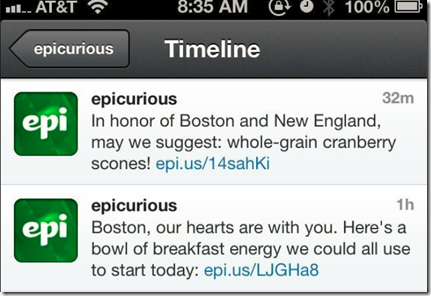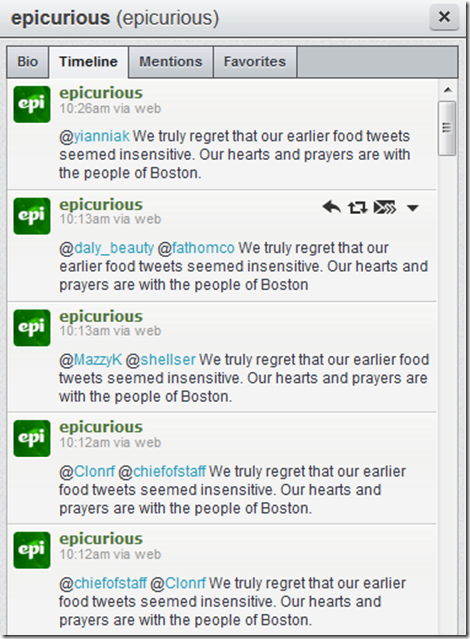Can Ignoring A Social Media Disaster Make It Go Away?
Last Tuesday, the day after the Boston Marathon bombings, the food website Epicurious—which has 388,000 Twitter followers—created a social media crisis by sending out the following tweets:
I wrote about the incident in more detail last week. Today, I’m interested in dissecting Epicurious’ crisis management response over the past six days.
Epicurious’ first response to the social media uproar was to send a stream of tweets, all saying the same thing, stating that their tweets “seemed” insensitive.
The linguistic choice of the word “seemed” appeared to shift the burden of blame onto the website’s overly sensitive readers, adding fuel to the social media flames. So on Tuesday afternoon, Epicurious went one step further:
Our food tweets this morning were, frankly, insensitive. Our deepest, sincere apologies.
— epicurious (@epicurious) April 16, 2013
Then, nothing. Silence. Six days passed without another word. No longer statements. No interactions with angry fans. No explanations of what went wrong. No commitment to getting it right in the future. No pledge to create policies preventing this from occurring in the future.
This morning, six days later, Epicurious suddenly showed up again and resumed its Twitter stream as if nothing had happened:
Celebrate #EarthDay with these 24 top-rated spring vegetable recipes: epi.us/11xsX5w
— epicurious (@epicurious) April 22, 2013
All of this raises a question: Did Epicurious do the right thing by going silent, waiting for the storm to pass, and then resuming when it had (mostly) blown over?
Let me make the case for their head-in-sand strategy. Executives at Conde Nast (Epicurious’ parent company) may have rightly calculated that these types of social media controversies are often short-lived and pass quickly. By waiting until the online fervor had subsided, they could just ride the wave to a moment of relative safety and continue business as usual. Plus, by making a longer statement, they would have just extended the news cycle as the statement itself would spawn new stories.
But that case, while partially true, is also nonsense.
Imagine if Epicurious had come out with a longer statement on Tuesday, such as:
“The tweets we sent this morning were incredibly insensitive. We’re devastated that in a moment of national tragedy, our actions made matters worse instead of better. We are all motivated by a mission of helping to improve people’s lives through healthier eating—and today, we let our readers down.
Please know that we take this extremely seriously and will take every necessary step to make sure this never happens again. In the meantime, our thoughts are with the people of Boston. We’re going to stop tweeting for the next week because we think it’s appropriate to let some time pass before resuming business as usual. In the meantime, on behalf of all of us at Epicurious, we are very, very sorry.”
Such a statement would have been added to every news and blog story about the incident, including mine, showing a brand that screwed up but took full accountability for its actions.
Instead, they said nothing. And that says to me that they learned nothing from this incident about the right way to use social media.
What do you think? Please leave your thoughts in the comments section below.





In the comments on your April 16th article on this topic you mentioned that the parent company Conde Nast had made a statement.
Would love to engage with you on GooglePlus where we are discussing this incident and I have linked to your articles:
https://plus.google.com/u/0/+LindaSherman/posts/TD14AkvgXim
If you get any further information, such as how this happened in the first place, eg something about the person was on the Twitter account, we’d love to hear about it.
Linda,
Thanks very much for your comment. I didn’t mention the Conde Nast statement here (it came in the form of a quote in a news article) because Epicurious failed to include it in the same platform that caused the crisis. In other words, a social media crisis usually has to be responded to on the same platform – otherwise, we can make a reasonable conclusion that many (if not most) of the people who saw the offending post never saw a lengthier explanation of it. Twitter crises should, at the minimum, garner a response on Twitter.
Thanks again. I’ll check out your Google+ page.
Best wishes,
Brad
P.S. I’ve searched for 15 minutes to try to find the comments by the Conde Nast executive and was unable to find them. That should never happen in crisis communications — they have their own channels and should be using them.
If anyone finds that link, please leave it in the comments section.
Thank you,
Brad